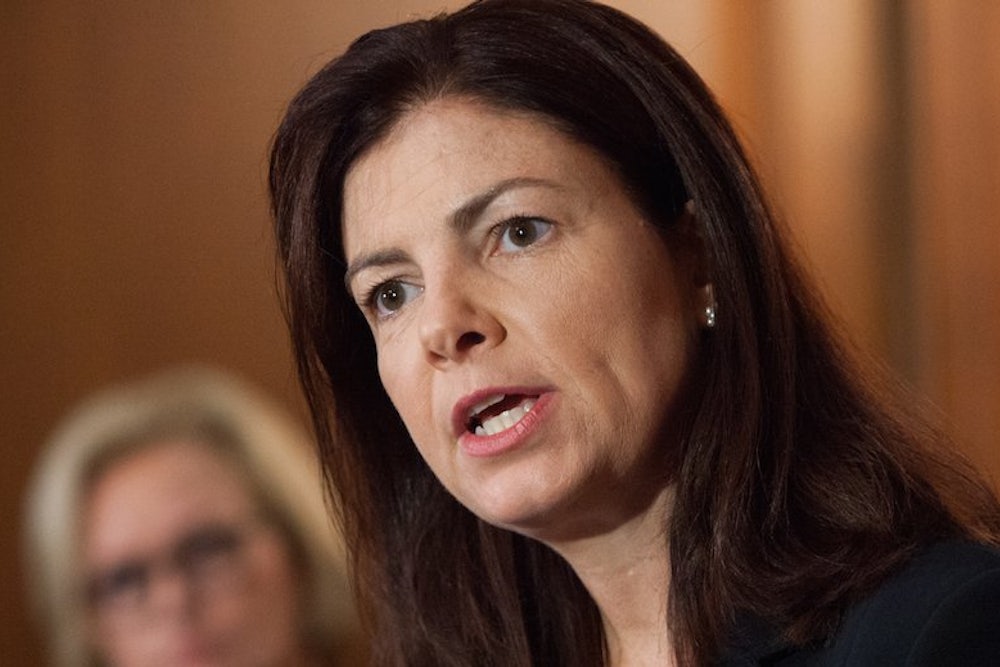You can count the number of Republican senators who accept climate change is mostly caused by humans on one hand. These were the only conservative lawmakers to vote yes on a Keystone XL amendment from Hawaii Democrat Brian Schatz that made the point that “human activity significantly contributes to climate change.” The senators in question: Susan Collins of Maine, Mark Kirk of Illinois, Lamar Alexander of Tennessee, Lindsey Graham of South Carolina, and Kelly Ayotte of New Hampshire.
If one name on this list is surprising, it’s Ayotte’s. Her record on the environment in her first term of Congress has been abysmal, earning a 26 percent score from the League of Conservation Voters (LCV), which scores members of Congress based on their voting records on issues like oil, coal, clean energy, and enviornmental regulations. She once pledged to Americans for Prosperity—the Koch brothers’ main political arm—that she would vote against any legislation on climate change. What is she doing casting pro-environment votes?
Ayotte split with Republicans 10 times on environmental amendments during the Keystone debate. According to a vote analysis from LCV, the only senator to vote more often with Democrats, on 11 energy-related amendments, was Susan Collins—who received environmental endorsements in the last election and is generally known as the most moderate of the GOP caucus on climate change.
Ayotte and Collins were the only two Republican senators to break party line on another failed resolution that attempted to limit President Barack Obama’s powers to forge an international climate deal. They voted against a proposal from Missouri’s Roy Blunt that would have nullified Obama’s climate agreement with China—the proposed resolution called the agreement to curb emissions a “bad deal for United States consumers, workers, families, and communities,” and “economically unfair and environmentally irresponsible.” Ayotte's communications director Liz Johnson pointed to the senator's “long record of standing up for clean air and crossing party lines to protect New Hampshire’s environment" as the reasoning behind her green Keystone votes.
Here’s a better explanation. The purple-state Republican faces reelection in 2016, and is belatedly positioning herself left of her party on energy and the environment. That doesn’t make her a true climate moderate, by any means. She voted to fastrack approval for the Keystone pipeline, and, like most Republicans, she’s gone back and forth on whether she believes climate change is manmade. “There is scientific evidence that demonstrates there is some impact from human activities,” Ayotte told the Portsmouth Herald editorial board in 2010. “However I don’t think the evidence is conclusive.”
Some environmentalists are skeptical that Ayotte plans on doing anything more substantial to boost her credibility before the 2016 election. After all, Schatz's pro-climate amendments stood no chance of reaching a 60-vote threshold, no matter how she voted. NextGen Climate Action, a super PAC that spent big against anti-climate Republicans in the midterms, sees her efforts as insufficient. “It’s not enough to simply acknowledge the problem—leaders in Washington need to come up with real solutions to tackle climate change,” NextGen spokesman Bobby Whithorne said.
Or, it could be a sign that members of the GOP caucus, wary of how unchecked climate denial comes across to voters, are looking for a better answer on climate change.
Less cynically, though, things might be changing. “Political observers may write this off as pure politics in anticipation of her 2016 reelection, but we may be witnessing the incubation of a climate hawkish Republican caucus,” RL Miller, cofounder of the grassroots organizing group Climate Hawks Vote, said. “One that recognizes the national security implications of rising waters, squabbling nations, and a climate debt too big to pass on to our children.”
